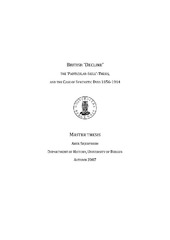British "decline". the 'particular-skill'-thesis, and the case of synthetic dyes 1856-1914
Master thesis
Permanent lenke
https://hdl.handle.net/1956/7394Utgivelsesdato
2007-11-20Metadata
Vis full innførselSammendrag
Broadberry has suggested that Germany and the USA overtook Britain largely by shifting resources out of agriculture and improving their relative productivity in services rather than in manufacturing. A group of new manufacturing industries that based on the new technologies of the 19th century: the chemical, electrical and optical industries, shows a different pattern. One of these, the chemical industry, was the first major new-technology industry in which Britain was overtaken by Germany. How this happened, and how the industry of one country was overtaken by the same industry of another country is extremely complex, and has, so far, defied satisfactory explanation. This thesis suggests that it is the type of explanations used in the historical accounts of the British organic chemical industry, or more precisely the synthetic dyestuffs industry, that have caused its under-representation in the more far-reaching study of the British ‘decline’. A second observation is that more recent contributions on the ‘decline’ of the British synthetic dyestuffs industry that offer new explanations have not been integrated into the recent contributions to the broader study of the British ‘decline’.
